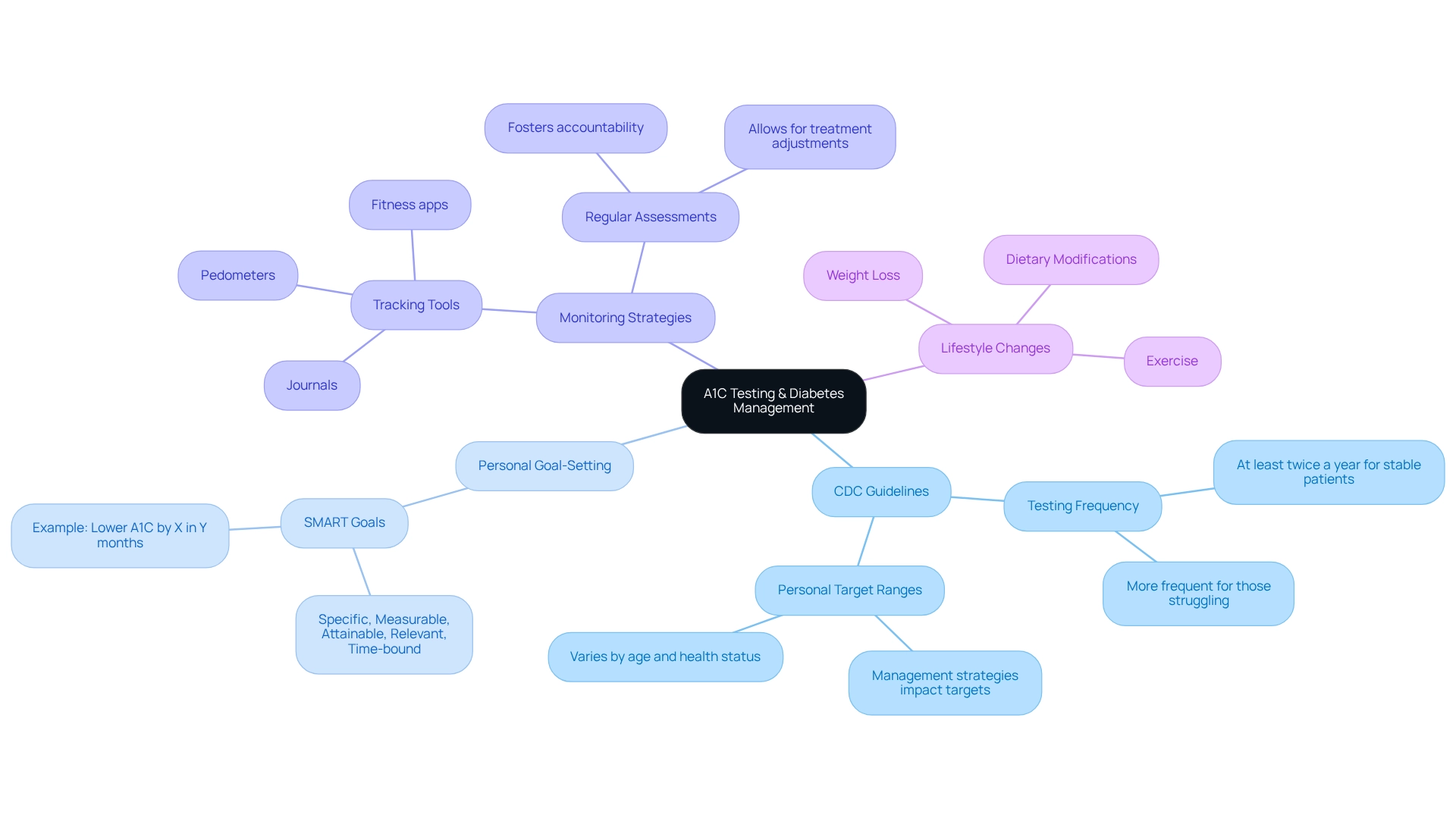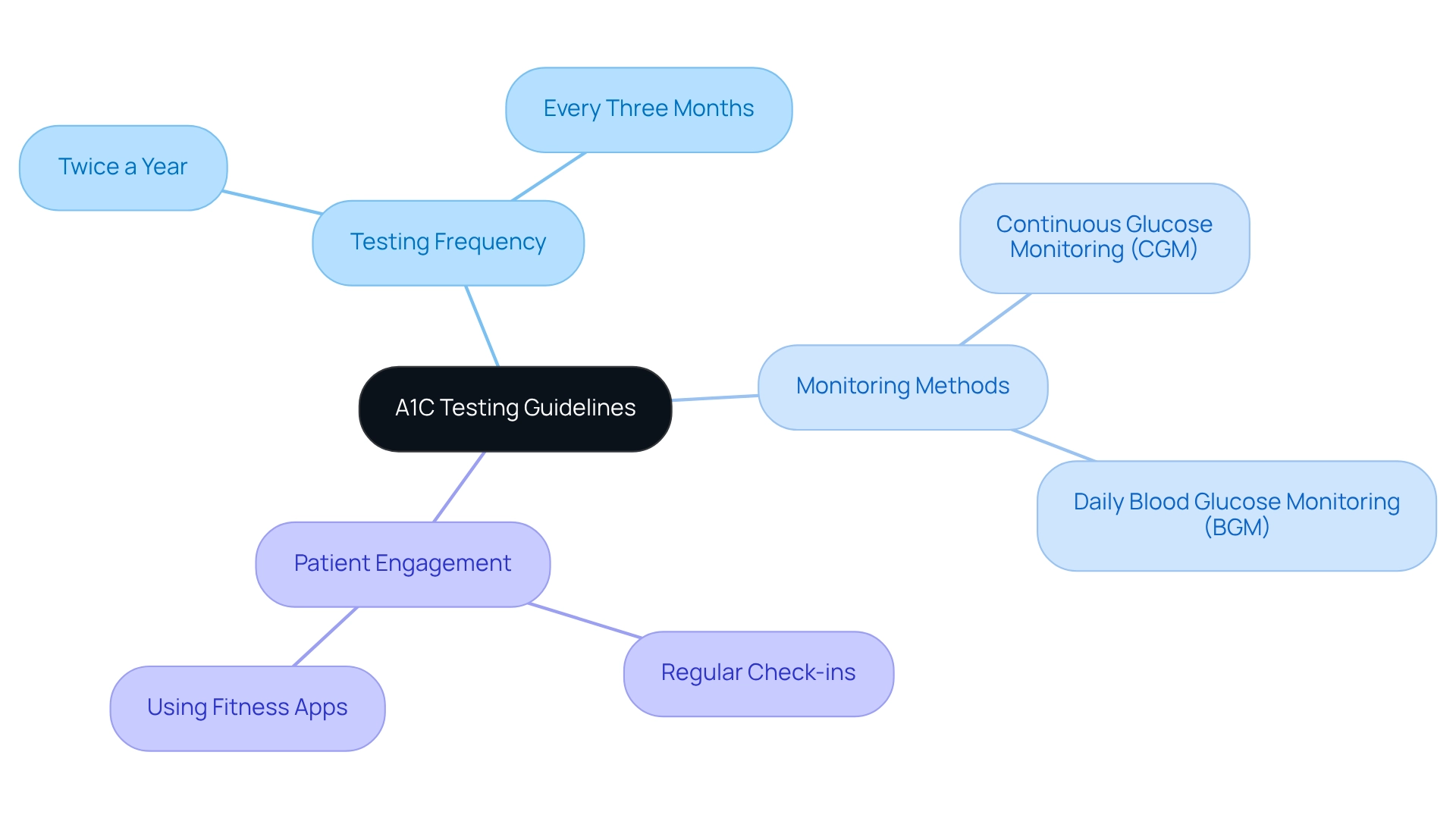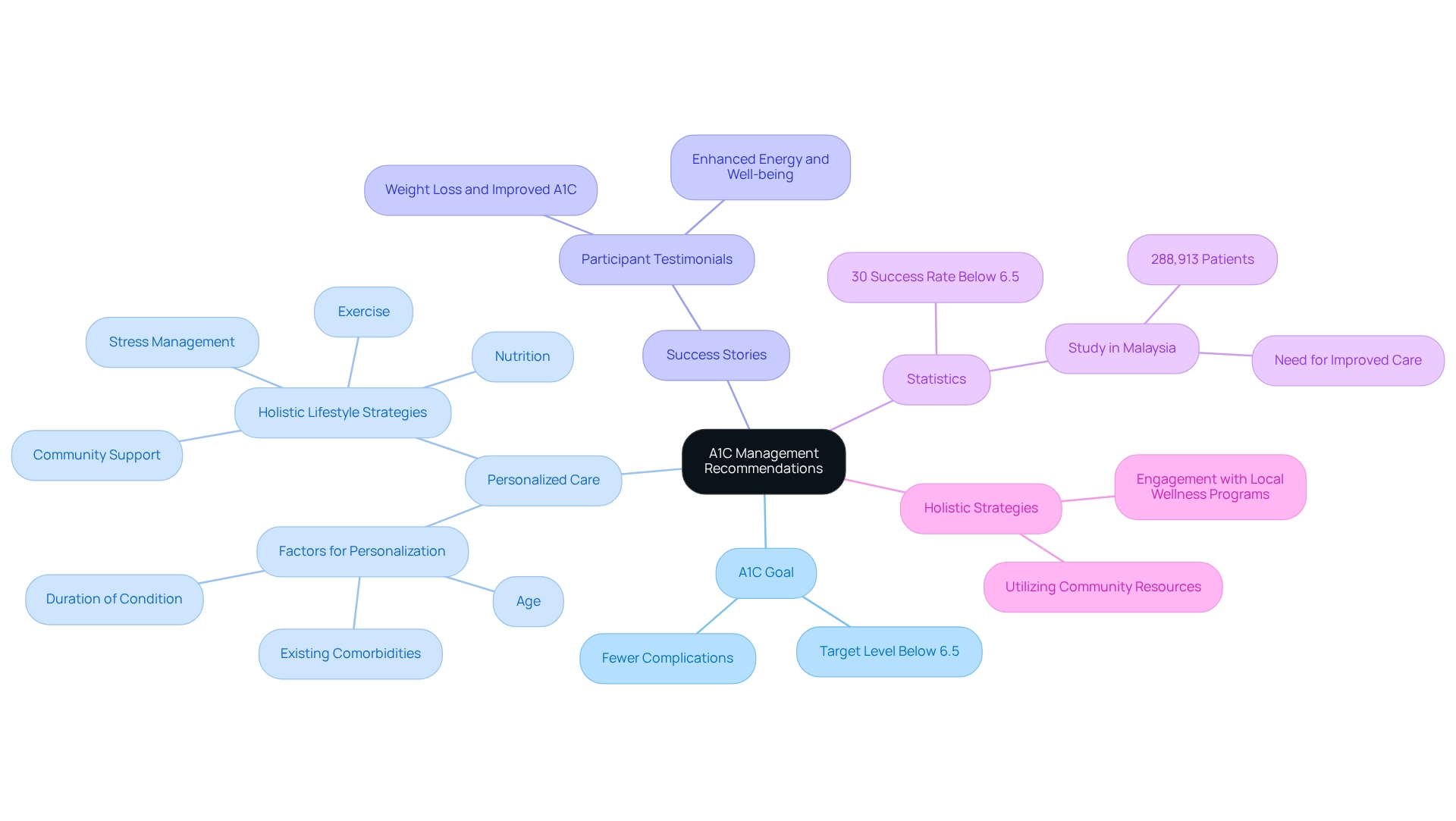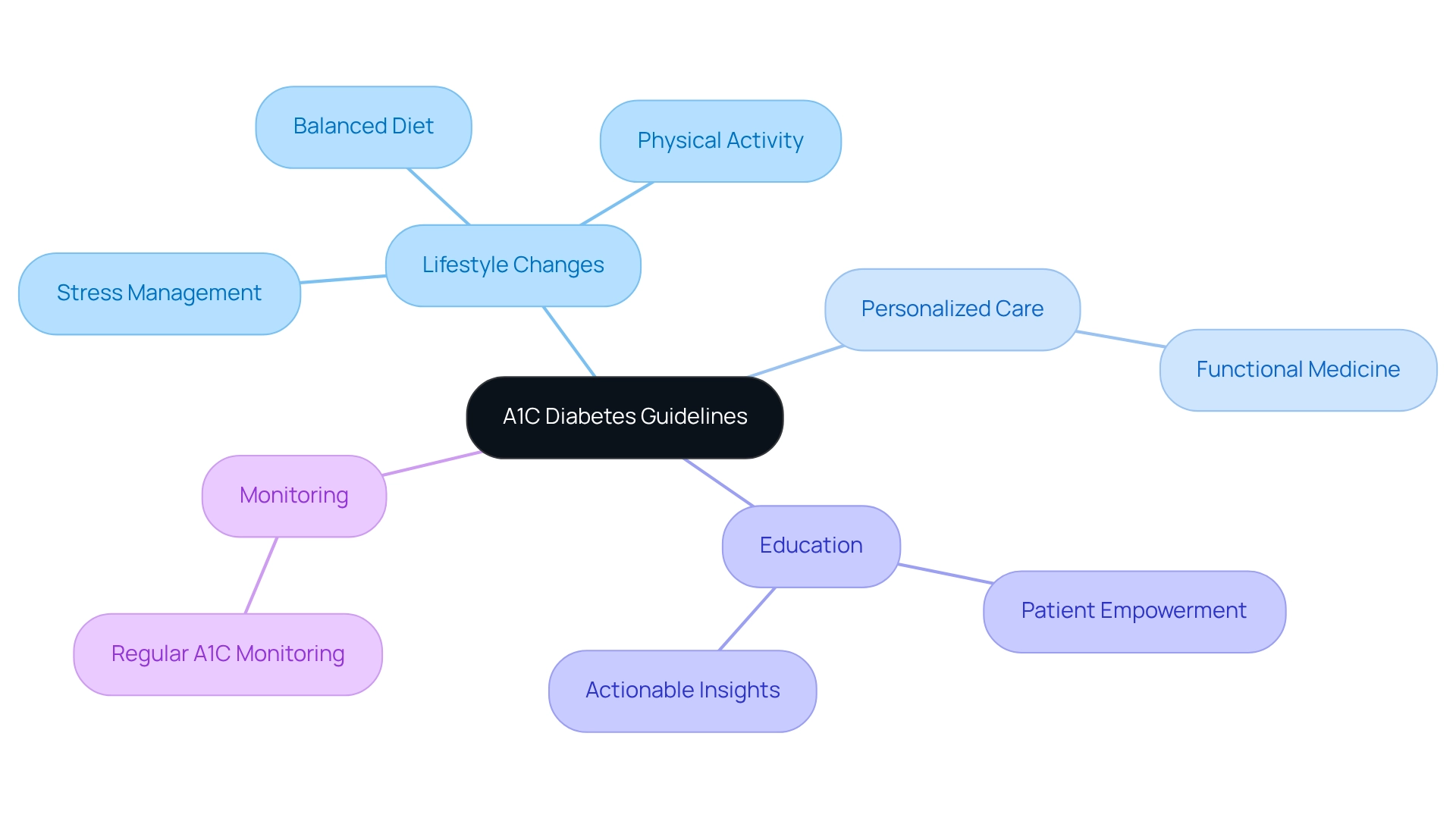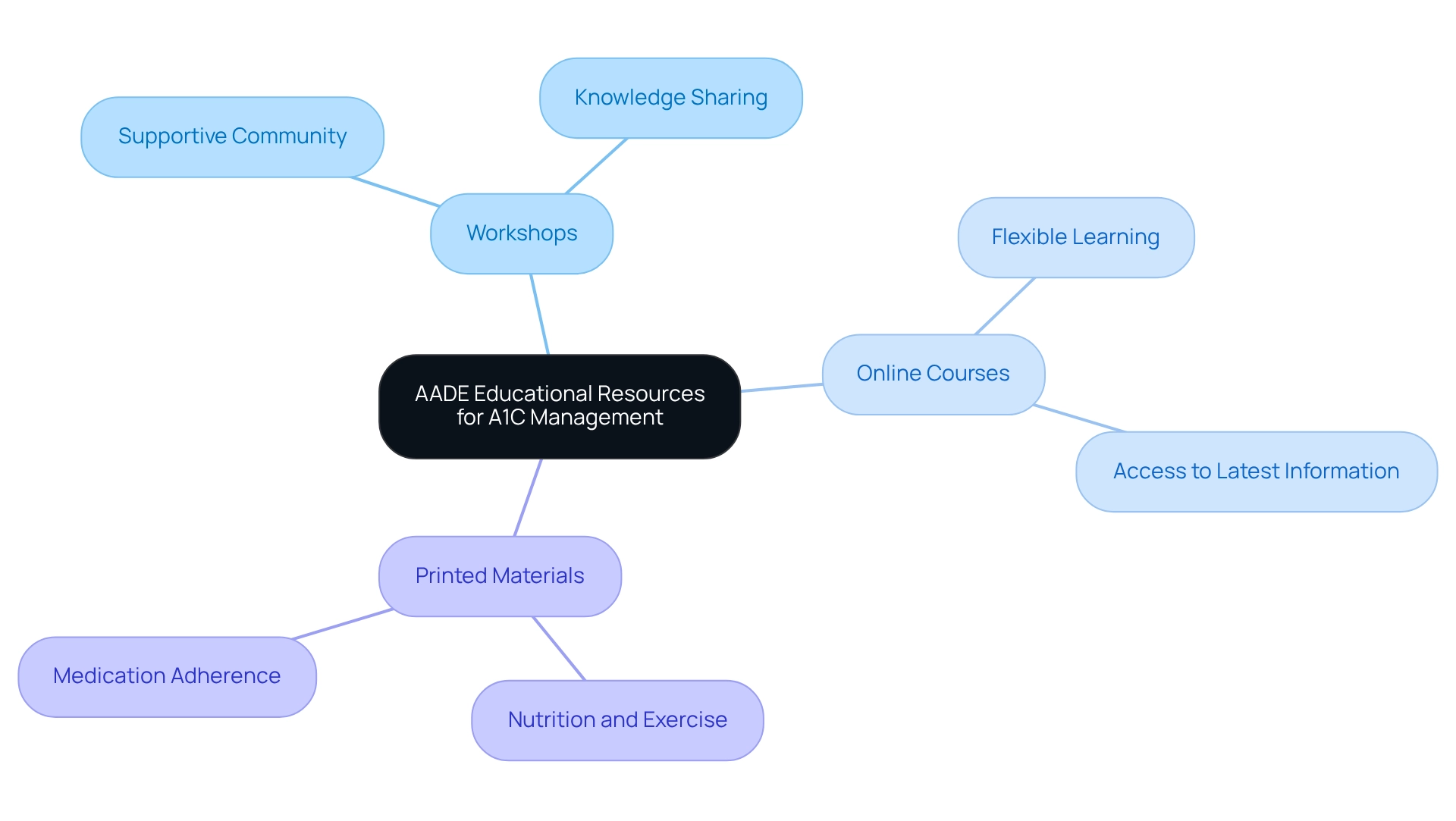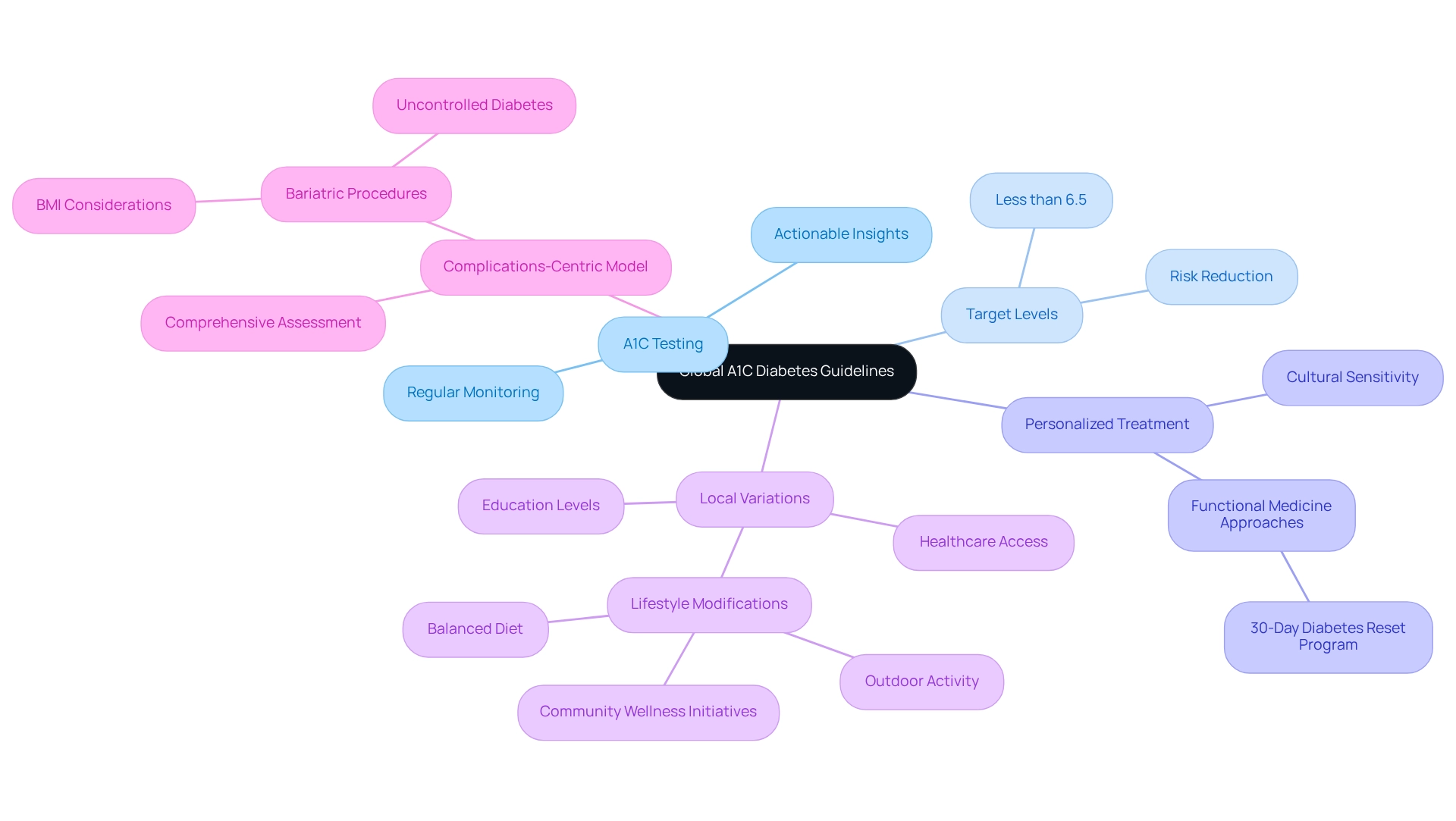Overview
The article centers on the essential A1C diabetes guidelines that are vital for effective diabetes management. It’s important to recognize that maintaining an A1C level below 7% is crucial for minimizing complications. Many patients find that personalized approaches, such as those offered in the 30-Day Diabetes Reset Program, significantly enhance their ability to achieve and sustain these targets. Through tailored coaching and lifestyle changes, individuals can feel more empowered in their journey toward better health.
Have you ever felt overwhelmed by managing your diabetes? You’re not alone. Many people share similar struggles, and it’s completely understandable. The good news is that with the right support and resources, achieving your health goals is within reach. The 30-Day Diabetes Reset Program offers compassionate guidance to help you navigate this journey.
By embracing these guidelines and seeking personalized support, you can take meaningful steps toward a healthier future. Remember, every small change counts, and you deserve to feel your best. Let’s take this journey together, one step at a time.
Introduction
In the realm of diabetes management, understanding A1C levels is crucial for achieving optimal health outcomes. With nearly 1 in 10 Americans living with diabetes, it’s important to recognize the significance of effective monitoring and personalized care. Many patients find that tailored strategies, advocated by organizations like the American Diabetes Association and the World Health Organization, empower them to take control of their health.
The journey to mastering A1C management involves more than just numbers; it encompasses education, lifestyle changes, and support systems that foster a proactive approach to health. Have you ever felt overwhelmed by the complexities of managing diabetes? Through innovative programs like Dr. Jason Shumard’s 30-Day Diabetes Reset, individuals are discovering the transformative power of personalized coaching and actionable insights. This leads to remarkable improvements in their health and well-being.
As the landscape of diabetes care continues to evolve, embracing these strategies can pave the way for a healthier, more empowered future. Remember, you are not alone on this journey; there are resources and support available to help you thrive.
Integrative Wellness Center: 30-Day Diabetes Reset Program for Effective A1C Management
Are you struggling to manage your diabetes? The 30-Day Diabetes Reset Program at Dr. Jason Shumard’s Integrative Wellness Center is here to help you take control of your health. This groundbreaking program is designed to empower individuals like you in managing your condition effectively.
With personalized coaching, nutritional guidance, and tailored physical activity plans, we focus on your unique needs, equipping you with the tools to implement sustainable lifestyle changes that can lead to significant improvements in your A1C levels. The A1C diabetes guidelines from the American Diabetes Association recommend maintaining an A1C goal of under 7%, and our program is thoughtfully crafted to support you in achieving that objective.
Education plays a vital role in your journey. Our program offers valuable resources that enhance your understanding of diabetes and the treatment options available to you. Many participants find that practical examples, such as a pilot study on nurse-coaching interventions for women with type 2 diabetes, highlight the effectiveness of customized coaching. This study showed improved A1C levels, demonstrating the positive impact that tailored support can have on your management of the condition.
This aligns perfectly with the principles of the 30-Day Reset Program, which emphasizes the importance of personalized coaching in effective blood sugar management as outlined in the A1C diabetes guidelines.
What if you could transform your experience with diabetes? Testimonials from individuals who have completed the program reveal profound transformations, with many expressing gratitude for the newfound control over their health and quality of life. Our comprehensive approach not only focuses on managing A1C levels but also fosters a deeper understanding of your condition, empowering you to take charge of your wellness journey.
With Dr. Shumard’s expertise in functional medicine, the Integrative Wellness Center stands at the forefront of providing effective strategies for reversing type 2 diabetes and enhancing your overall well-being.
American Diabetes Association: Recommended A1C Targets for Optimal Health
The American Diabetes Association (ADA) sets a standard A1C target of less than 7% for most adults with diabetes according to the a1c diabetes guidelines. This benchmark is crucial for minimizing the risk of complications such as cardiovascular disease and neuropathy. It’s important to recognize that keeping A1C levels below this threshold can significantly lower the chances of diabetes-related complications. However, many individuals face unique challenges. For those with a history of severe hypoglycemia or limited life expectancy, a more flexible target of 7% to 8% may be advisable.
Consistent tracking of A1C levels is vital according to a1c diabetes guidelines, as it allows for timely adjustments to treatment plans based on personal medical circumstances. Many patients find that staying informed about their A1C levels empowers them in their health journey. Recent data from the American Diabetes Association shows that around 50% of adults with the condition meet the recommended A1C targets. This statistic highlights the ongoing difficulties in managing diabetes, especially considering safety concerns in healthcare environments, such as the troubling rates of medication errors and hospital-acquired infections.
Effective A1C management, as outlined in the a1c diabetes guidelines, is not just about numbers; it plays a pivotal role in preventing complications. The ADA encourages considering SGLT2 inhibitors or GLP-1 receptor agonists for their cardiovascular benefits, independent of A1C goals. Real-life experiences show that individuals who actively engage in their wellness management, like participants in Dr. Jason Shumard’s 30-Day Diabetes Reset program, often report achieving A1C levels below 7%. Many express gratitude for the empowerment they feel in overseeing their well-being, underscoring the importance of personalized attention and guidance in managing their condition. As Dr. Jason Shumard states, “By providing individuals with actionable insights and practical tools, the center fosters an environment where they can reclaim their health and well-being.
American College of Physicians: Guidelines for A1C Management in Type 2 Diabetes
The American College of Physicians (ACP) refers to the A1C diabetes guidelines, which suggest an A1C goal of 7% to 8% for most individuals with type 2 diabetes, balancing effective glycemic control with the need to reduce treatment risks. It’s important to recognize that personalized treatment plans are essential. They should take into account individual preferences, existing comorbidities, and the risk of hypoglycemia. Clinicians should avoid targeting an HbA1c level in individuals with a life expectancy of less than 10 years, especially older adults or those with chronic conditions. Regular follow-ups and therapy adjustments are crucial for achieving effective targets.
Many patients find that real-world applications of these guidelines demonstrate their effectiveness. For instance, at Integrative Wellness Center, Dr. Jason Shumard employs a holistic approach that addresses not just the symptoms of type 2 diabetes, but also uncovers and treats underlying causes. This comprehensive strategy has led to significant improvements in outcomes for individuals, as evidenced by testimonials from those who have experienced remarkable transformations. One individual shared, “I lost 55 lbs. My A1C started at 9.1, and after 8 months, it is now 5.7,” highlighting the empowerment felt by individuals reclaiming their well-being through Dr. Shumard’s care. Another noted, “I feel so much better… I lost a lot of weight, have more energy and feel great. I am not depressed anymore and I don’t need my meds anymore!” Dr. Shumard emphasizes, “By offering individuals actionable insights and practical tools, the center nurtures a setting where people can regain their wellness and well-being.”
Expert opinions further reinforce the ACP’s stance on individualized care as outlined in the A1C diabetes guidelines. The SIGN guidelines stress the importance of balancing benefits and harms in treatment plans, particularly concerning hypoglycemia and weight gain. Clinicians are encouraged to customize A1C objectives based on an individual’s life expectancy and overall health status. The ACP’s 2025 A1C diabetes guidelines emphasize that a one-size-fits-all approach is inadequate; instead, clinicians should prioritize strategies that balance the benefits of glycemic control with the potential for adverse effects.
Statistics suggest that personalized treatment plans can lead to improved A1C management. Research demonstrates that individuals who receive tailored interventions experience more favorable outcomes. By concentrating on personalized care, healthcare providers can greatly enhance the quality of life for patients with type 2 conditions, ultimately decreasing dependence on traditional medical treatments.
Centers for Disease Control and Prevention: Insights on A1C Testing and Diabetes
The Centers for Disease Control and Prevention (CDC) highlights the essential role of regular A1C testing as recommended by a1c diabetes guidelines for those managing their blood sugar levels. This test, reflecting average blood sugar levels over the past two to three months, provides a thorough assessment of glycemic control. According to the a1c diabetes guidelines set by the CDC, individuals experiencing blood sugar issues should have their A1C levels checked at least twice a year if they are meeting their treatment goals. However, for those struggling to meet these objectives, more frequent testing is crucial to allow for timely adjustments to their treatment plans. It’s important to recognize that personal target ranges for A1C can vary based on age, health condition, and management strategies, underscoring the need for personalized care in managing this condition.
Current statistics reveal that approximately 1 in 10 Americans faces this challenge, emphasizing the need for effective monitoring strategies. Regular A1C testing is vital, as it not only aids in tracking progress but also informs necessary lifestyle and dietary changes. The CDC encourages healthcare providers to engage individuals in discussions about their target blood sugar levels and the frequency of A1C tests, in accordance with the a1c diabetes guidelines, ensuring that everyone feels informed and empowered in their diabetes management journey.
To enhance tracking progress, individuals are encouraged to set SMART goals—specific, measurable, attainable, relevant, and time-bound. For example, a patient might aim to lower their A1C levels by a certain percentage within a defined timeframe, which can significantly enhance focus and motivation. Additionally, utilizing tracking tools like fitness apps, journals, and pedometers can help individuals monitor their daily activities and dietary choices, further supporting their wellness goals. Regularly assessing one’s progress fosters accountability and allows for adjustments in response to changing physical conditions.
Real-world examples showcase the positive impacts of consistent A1C monitoring. Patients who adhere to regular testing often report improved management of their health and a greater sense of control over their condition. This proactive approach aligns with expert insights that, while medication is important for blood sugar control, lifestyle changes—such as diet and exercise—can greatly improve treatment outcomes. Dr. Jack Ende, president of the ACP, states, “Although ACP’s guidance statement focuses on drug therapy to control blood sugar, a lower treatment target is appropriate if it can be achieved with diet and lifestyle modifications such as exercise, dietary changes, and weight loss.”
Furthermore, resources like Dr. Jason Shumard’s book on reversing type 2 conditions provide valuable insights into lifestyle changes that can empower individuals on their wellness journey. By prioritizing regular A1C testing and adopting effective goal-setting strategies, individuals can take charge of their condition, leading to improved well-being and quality of life. The CDC’s a1c diabetes guidelines for testing frequency in 2025 further emphasize the importance of this practice, alongside statistics indicating that a significant number of individuals with the condition do not reach their treatment goals based on A1C testing. By incorporating these insights, individuals can take meaningful steps toward reclaiming their health.
National Institute of Diabetes and Digestive and Kidney Diseases: A1C Testing Guidelines
The National Institute of Diabetes and Digestive and Kidney Diseases (NIDDK) understands the challenges faced by individuals managing diabetes. According to the a1c diabetes guidelines, they recommend that if your blood sugar levels are stable, you should undergo A1C testing at least twice a year. However, if your treatment has changed or you’re finding it difficult to meet your glycemic targets, testing every three months is recommended by the a1c diabetes guidelines. This approach highlights the importance of regular monitoring in managing diabetes-related health, especially considering that over 50% of patients at the clinic rely on Medicaid insurance. Accessible care options are crucial for everyone.
A1C levels provide a valuable estimate of your average blood sugar over the past two to three months, yet they may not capture daily fluctuations fully. It’s important to recognize that A1C results should be interpreted alongside individualized continuous glucose monitoring (CGM) and daily blood glucose monitoring (BGM). This dual approach allows for more personalized treatment plans and better wellness outcomes.
Many patients find that actively engaging in their care can make a significant difference. Regularly checking your A1C levels and discussing the results with your healthcare provider is essential as outlined in the a1c diabetes guidelines. Dr. Jason Shumard emphasizes, “By offering individuals actionable insights and practical resources, the center cultivates an atmosphere where people can restore their wellness and well-being.” Implementing effective strategies for tracking progress, such as utilizing fitness apps and setting SMART goals, can greatly enhance your engagement and motivation in managing your condition.
Case studies have shown that these proactive management strategies lead to improved A1C levels and overall well-being. By adhering to the a1c diabetes guidelines, you can manage your condition more effectively and achieve stable A1C levels, ultimately enhancing your quality of life. Remember, you are not alone on this journey; there are resources and support available to help you thrive.
American Association of Clinical Endocrinologists: A1C Management Recommendations
The American Association of Clinical Endocrinologists (AACE) sets a compassionate A1C diabetes guidelines goal of below 6.5% for most adults facing blood sugar challenges. This standard is linked to fewer complications and a greater sense of well-being. It’s important to recognize that treatment strategies should be personalized, taking into account factors like age, duration of the condition, and any existing comorbidities. Transformative experiences, such as those from Dr. Jason Shumard’s 30-Day Reset program, showcase how customized approaches can effectively reverse type 2 conditions and enhance overall health. For instance, one participant shared, “I have lost 55 lbs. My A1C started at 9.1 after 8 months it is now 5.7,” highlighting the program’s significant impact. Another individual expressed, “I feel so much better… I lost a lot of weight, have more energy and feel great. I am not depressed anymore and I don’t need my meds anymore!!!” These heartfelt testimonials illustrate the profound changes that can arise through personalized care.
Many patients find that maintaining optimal A1C levels can be challenging. A study involving over 288,000 individuals with type 2 conditions in Malaysia revealed this struggle, underscoring the critical need for personalized strategies in care. Regular monitoring and timely adjustments to therapy are vital for achieving and sustaining the targets set by the A1C diabetes guidelines. Moreover, recent statistics indicate that only around 30% of individuals with high blood sugar successfully reach A1C levels below 6.5%, which highlights the persistent difficulties in managing this condition as outlined in the A1C diabetes guidelines. Clinical endocrinologists advocate for personalized strategies, recognizing that extended periods of type 2 conditions and cognitive or psychological challenges can complicate adherence to A1C diabetes guidelines.
By focusing on personalized care and incorporating holistic lifestyle strategies—such as nutrition, exercise, community support, and stress management—healthcare providers can significantly improve A1C levels and overall patient well-being. In San Marcos, CA, engaging with local wellness programs and utilizing community resources can further enhance these efforts, ultimately leading to improved quality of life and reduced reliance on conventional medical interventions.
Diabetes Care Journal: Research-Based A1C Guidelines for Patients
The Diabetes Care Journal provides essential research-backed A1C diabetes guidelines that emphasize the vital importance of achieving and maintaining optimal A1C levels for effective diabetes management. It’s crucial to recognize that recent findings show that adhering to the A1C diabetes guidelines of keeping a target of less than 7% can significantly reduce the risk of complications related to diabetes. Many patients find that a multifaceted approach—incorporating lifestyle changes, adhering to prescribed medications, and regularly monitoring A1C levels as outlined in the A1C diabetes guidelines—can lead to better blood sugar control.
Lifestyle changes, such as adopting a balanced diet, engaging in regular physical activity, and managing stress, can greatly influence the A1C diabetes guidelines. Real-world examples reveal how individuals who embrace these modifications often experience notable improvements in their A1C readings. For instance, feedback from individuals at the Integrative Wellness Center highlights how Dr. Shumard’s emphasis on personalized functional medicine has yielded positive outcomes for those striving to manage their blood sugar levels. By focusing on each person’s unique health profile, the center crafts customized treatment strategies that address the root causes of the condition rather than merely alleviating symptoms.
Moreover, the latest studies stress the need for tailored care strategies that align with individual needs, reinforcing the importance of education and empowerment in effectively managing diabetes according to the A1C diabetes guidelines. As Dr. Jason Shumard beautifully states, “By providing individuals with actionable insights and practical tools, the center fosters an environment where they can reclaim their health and well-being.” This compassionate approach also integrates stress management techniques, such as mindfulness and yoga, which are essential for achieving better blood sugar control.
It’s also important to note the absence of state-level data on the prevalence of achieving ABCS goals, which can pose challenges in diabetes management. By equipping individuals with the knowledge and resources to take charge of their health, the center cultivates an environment conducive to reaching optimal A1C levels and enhancing overall well-being. Individuals with Type 2 Diabetes are encouraged to embrace these lifestyle changes and seek additional education to manage their condition effectively.
American Association of Diabetes Educators: Educational Resources for A1C Management
The American Association of Diabetes Educators (AADE) offers a wide range of educational resources that align with A1C diabetes guidelines to empower patients in effectively managing their A1C levels. These resources include:
- Workshops
- Online courses
- Printed materials
These materials cover essential aspects of managing diabetes, such as nutrition, exercise, and medication adherence. It’s important to recognize that engaging in diabetes self-management education can lead to a statistically significant decrease in A1C levels, underscoring the significance of A1C diabetes guidelines in these educational initiatives.
Many patients find that the workshops and courses offered by the AADE not only equip them with essential knowledge but also foster a supportive community where they can share experiences and strategies. Real-world instances show that individuals who actively participate in these educational initiatives feel more knowledgeable and empowered, leading to improved wellness management and outcomes. Dr. Jason Shumard emphasizes, “By offering individuals actionable insights and practical tools, the center fosters an environment where people can reclaim their health and well-being.”
As we look ahead to 2025, the AADE is committed to enhancing its educational offerings, ensuring that individuals have access to the latest information and resources necessary for effective management of their condition. Statistics indicate that approximately 70% of individuals utilizing these educational resources experience improved A1C levels, underscoring the critical role of tailored diabetes self-management education (DSME) interventions aligned with A1C diabetes guidelines in enhancing disease management and self-care strategies.
To complement these resources, individuals are encouraged to adopt structured walking programs as part of their daily routine. Starting with a realistic goal, such as a daily walk of 10-15 minutes, can significantly enhance overall wellness. Monitoring progress through journals or applications not only sustains motivation but also allows individuals to celebrate their accomplishments. Joining walking groups or finding a companion can further enhance accountability and enjoyment, making the journey toward improved well-being more engaging.
By utilizing these resources, including Dr. Shumard’s books and seminars, patients can take proactive steps toward achieving their A1C goals while following the A1C diabetes guidelines and restoring their well-being. Additionally, studies show that organized walking initiatives can lead to substantial health improvements, with a success rate of 89.5% among participants, reinforcing the effectiveness of these programs. Remember, every small step you take brings you closer to better health.
World Health Organization: Global A1C Guidelines for Diabetes Management
The World Health Organization (WHO) has established comprehensive global A1C diabetes guidelines for managing blood sugar conditions, which include specific recommendations for A1C testing and target levels. It’s important to recognize that individuals with this condition should aim for an A1C level of less than 6.5% as recommended by the A1C diabetes guidelines to significantly reduce the risk of complications. Regular monitoring of A1C levels is crucial, as it is emphasized in the A1C diabetes guidelines, allowing for timely adjustments to treatment plans tailored to individual patient needs.
These A1C diabetes guidelines highlight the importance of personalized treatment strategies that consider cultural and regional variations in managing blood sugar conditions. For instance, many patients find that in San Marcos, CA, lifestyle modifications—such as adopting a balanced diet rich in local produce, engaging in consistent outdoor activity, and participating in community wellness initiatives—can greatly enhance their ability to manage diabetes-related health issues. The implementation of A1C diabetes guidelines may vary based on local dietary habits, healthcare access, and levels of education among individuals. By following the A1C diabetes guidelines, healthcare providers can enhance outcomes for individuals with health conditions, ensuring they receive care that is both effective and culturally sensitive.
Dr. Jason Shumard emphasizes, “By offering individuals actionable insights and practical tools, the center fosters an environment where people can reclaim their health and well-being.” This approach aligns with the WHO guidelines and emphasizes the A1C diabetes guidelines, as it underscores the importance of empowering patients in their health management through personalized functional medicine approaches that focus on tailored nutrition and testing.
Many individuals may not be aware that recent statistics indicate a significant portion of the global population with this condition is not meeting the A1C diabetes guidelines, highlighting the need for improved education and resources. The Complications-Centric Model emphasizes the underlying components of a comprehensive assessment for overweight and obesity, which is crucial in addressing the complexities of diabetes management.
Moreover, case studies have shown that applying A1C diabetes guidelines can lead to improved well-being outcomes. Individuals often express feeling empowered and knowledgeable about their wellness management. Transformative experiences with Dr. Shumard’s 30-Day Diabetes Reset program illustrate this effectiveness, showcasing how personalized strategies can lead to life-changing results. This comprehensive method not only addresses the medical facets of the condition but also cultivates a nurturing atmosphere for individuals to regain their well-being.
Empowerment Through Education: Understanding A1C Guidelines for Better Health
Empowerment through education is essential for effectively managing diabetes. Many individuals face challenges in understanding their health, but a comprehensive grasp of A1C diabetes guidelines can truly transform their health journey. By recognizing the significance of A1C testing, understanding target levels, and learning how lifestyle choices impact blood sugar control, individuals can make informed decisions about their care. Educational programs, workshops, and resources provided by healthcare professionals play a crucial role in nurturing this empowerment.
For instance, a study conducted in Shiraz, Iran, showed that self-management education significantly improved the quality of life for elderly females with type 2 diabetes. This highlights the tangible benefits of such initiatives. It’s important to recognize that individual empowerment is key to effective diabetes management. Evidence suggests that those who are knowledgeable about their condition often achieve better A1C control and experience fewer complications.
Have you considered incorporating effective strategies for tracking your progress? Utilizing fitness apps and setting SMART goals—specific, measurable, attainable, relevant, and time-bound—can significantly enhance your engagement. For example, aiming to achieve a certain number of steps daily or gradually increasing your exercise duration can foster accountability and motivation.
Dr. Jason Shumard emphasizes the need for further research into the effects of diabetic empowerment strategies on lifestyle habits and quality of life. He believes that these strategies could greatly improve outcomes for individuals. Furthermore, it’s essential to acknowledge that traditional treatments for blood sugar issues may unintentionally lead to insulin resistance, complicating management efforts. By participating in educational programs and adopting structured goal-setting practices, patients not only deepen their understanding of A1C diabetes guidelines but also cultivate a proactive approach to managing their diabetes. This ultimately leads to improved health outcomes and a higher quality of life. Remember, you are not alone in this journey, and there are resources available to support you every step of the way.
Conclusion
Understanding and managing A1C levels is essential for individuals living with diabetes, as it directly impacts overall health and well-being. It’s important to recognize that various programs and guidelines, particularly Dr. Jason Shumard’s 30-Day Diabetes Reset, demonstrate the effectiveness of personalized coaching, education, and lifestyle modifications in achieving optimal A1C targets. With the American Diabetes Association recommending a target of less than 7%, it becomes clear that tailored approaches are vital in empowering patients to take control of their health.
Many patients find that regular monitoring of A1C levels, as emphasized by organizations like the CDC and WHO, plays a pivotal role in adjusting treatment plans and fostering accountability. Engaging in educational resources and support systems not only enhances understanding but also encourages proactive health management. Real-world testimonials from patients showcase significant improvements in their A1C levels and overall quality of life, highlighting the transformative experiences that can arise from embracing these strategies.
In summary, the journey to effective diabetes management is multifaceted, requiring a commitment to education, personalized care, and lifestyle changes. By embracing these principles and leveraging available resources, individuals can reclaim their health and thrive on their diabetes management journey. The path may be challenging, but with the right support and strategies, a healthier future is within reach.
Frequently Asked Questions
What is the 30-Day Diabetes Reset Program?
The 30-Day Diabetes Reset Program at Dr. Jason Shumard’s Integrative Wellness Center is designed to help individuals manage their diabetes effectively through personalized coaching, nutritional guidance, and tailored physical activity plans.
What are the A1C goals recommended for diabetes management?
The American Diabetes Association recommends maintaining an A1C goal of under 7% for most adults with diabetes to minimize the risk of complications. For individuals with a history of severe hypoglycemia or limited life expectancy, a more flexible target of 7% to 8% may be advisable.
How does education play a role in the program?
The program provides valuable resources to enhance participants’ understanding of diabetes and treatment options, emphasizing the importance of education in managing the condition effectively.
Are there any success stories from participants in the program?
Yes, many participants report profound transformations and express gratitude for the control they gain over their health and quality of life after completing the program.
What approach does Dr. Shumard take in managing diabetes?
Dr. Shumard employs a holistic approach that addresses not only the symptoms of type 2 diabetes but also uncovers and treats underlying causes, which has led to significant improvements in outcomes for individuals.
What is the significance of tracking A1C levels?
Consistent tracking of A1C levels is vital as it allows for timely adjustments to treatment plans based on personal medical circumstances, empowering individuals in their health journey.
What does recent data suggest about A1C management?
Recent data indicates that around 50% of adults with diabetes meet the recommended A1C targets, highlighting the ongoing challenges many face in managing their condition.
How do personalized treatment plans impact diabetes management?
Personalized treatment plans can lead to improved A1C management and overall quality of life for patients, as they address individual preferences, existing comorbidities, and the risk of hypoglycemia.

